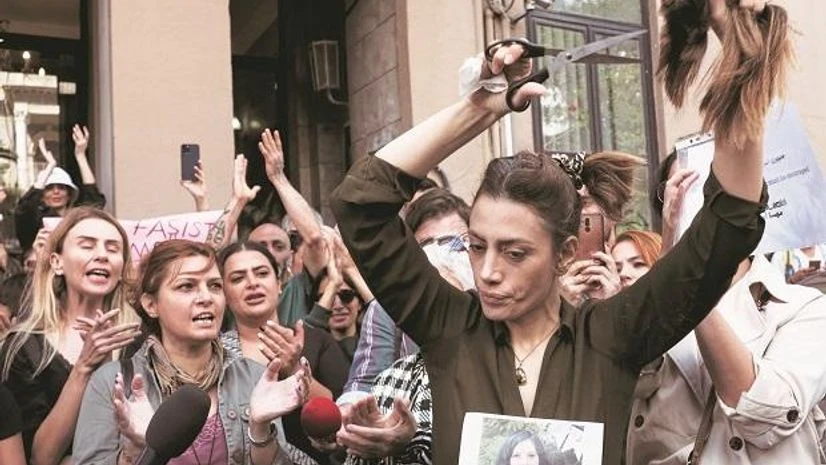Iranians experienced widespread internet disruptions on Wednesday amid days of mass protests against the government, including a loss of access to Instagram, one of the last Western social media platforms available in the country.
An Iranian official had earlier hinted that such measures might be taken out of security concerns, and the loss of connectivity will make it more difficult for people to organise protests and share information about the government's rolling crackdown on dissent.
Iran has seen nationwide protests over the death of 22-year-old Mahsa Amini, who was detained for allegedly wearing the mandatory Islamic headscarf too loosely. Demonstrators have clashed with police and called for the downfall of the Islamic Republic itself, even as Iran's President Ebrahim Raisi addressed the UN General Assembly on Wednesday.
London-based rights group Amnesty International said Wednesday that security forces had used batons, birdshot, tear gas, and water cannons to disperse protesters. It reported eight deaths linked to the unrest, including four people killed by security forces. It said hundreds more have been wounded.
Iranian officials have reported three deaths, blaming them on unnamed armed groups.
Witnesses in Iran, who spoke on condition of anonymity for fear of reprisal, said late Wednesday they could no longer access the internet using mobile phones.
More From This Section
NetBlocks, a London-based group that monitors internet access, meanwhile reported widespread disruptions to both Instagram and WhatsApp. Both are owned by Facebook parent Meta, which did not immediately respond to a request for comment.
Earlier on Wednesday, Iran's Telecommunications Minister Isa Zarepour was quoted by state media as saying that certain restrictions might be imposed due to security issues," without elaborating.
Iran already blocks Facebook, Telegram, Twitter and YouTube, even though top Iranian officials use public accounts on such platforms. Many Iranians get around the bans using virtual private networks, known as VPNs, and proxies.
In a separate development, several official websites, including those for the supreme leader, the president and the Central Bank, were taken down at least briefly as hackers claimed to have launched a cyberattack on state agencies.
Hackers linked to the shadowy Anonymous movement said they targeted other Iranian state agencies, including state TV.
Central Bank spokesman Mostafa Qamarivafa denied that the bank itself was hacked, saying only that the website was inaccessible because of an attack on a server that hosts it, in remarks carried by the official IRNA news agency. The website was later restored.
Iran has been the target of several cyberattacks in recent years, many by hackers expressing criticism of its theocracy. Last year, a cyberattack crippled gas stations across the country, creating long lines of angry motorists unable to get subsidised fuel for days. Messages accompanying the attack appeared to refer to Iran's Supreme Leader Ayatollah Ali Khamenei.
Amini's death has sparked protests across the country. The police say she died of a heart attack and was not mistreated, but her family has cast doubt on that account, saying she had no previous heart issues and that they were prevented from seeing her body.
The UN human rights office says the morality police have stepped up operations in recent months and resorted to more violent methods, including slapping women, beating them with batons and shoving them into police vehicles.
President Joe Biden, who also spoke at the UN General Assembly on Wednesday, voiced support for the protesters, saying "we stand with the brave citizens and the brave women of Iran, who right now are demonstrating to secure their basic rights.
The UK also released a statement Wednesday calling for an investigation into Amini's death and for Iran to respect the right to peaceful assembly.
Raisi has called for an investigation into Amini's death. Iranian officials have blamed the protests on unnamed foreign countries that they say are trying to foment unrest.
Iran has grappled with waves of protests in recent years, mainly over a long-running economic crisis exacerbated by Western sanctions linked to its nuclear program.
The Biden administration and European allies have been working to revive the 2015 Iran nuclear accord, in which Iran curbed its nuclear activities in exchange for sanctions relief, but the talks have been deadlocked for months.
In his speech at the UN, Raisi said Iran is committed to reviving the nuclear agreement but questioned whether it could trust America's commitment to any accord.
Iran insists its nuclear programme is for peaceful purposes. It began ramping up its nuclear activities after then-President Donald Trump unilaterally withdrew from the 2015 agreement, and experts say it now likely has enough highly-enriched uranium to make a bomb if it chooses to do so.
(Only the headline and picture of this report may have been reworked by the Business Standard staff; the rest of the content is auto-generated from a syndicated feed.)

)
